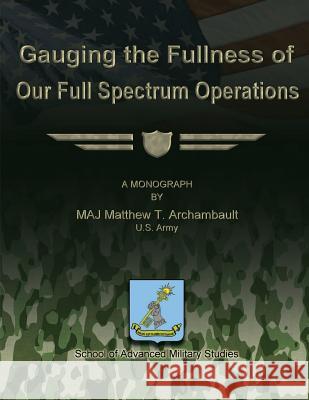Gauging the Fullness of Our Full Spectrum Operations » książka
Gauging the Fullness of Our Full Spectrum Operations
ISBN-13: 9781480022638 / Angielski / Miękka / 2012 / 86 str.
Officer education is a major component in the preparation for the next war. The Command and General Staff College (CGSC) is the Army's principal institution for educating field grade officers. War's chameleon nature sometimes denies and frustrates the ability of nations to accurately predict and prepare for the next war. The major dichotomy plaguing the prediction and preparation for the next war is major conventional combat operations and irregular warfare. Army doctrine currently places these supposed polar opposites within the full spectrum of operations. This research examines how well CGSC prepared officers for full spectrum operations in two historical case studies. This monograph argues that CGSC failed to prepare officers for full spectrum operations. Three significant factors contributing to this failure are the nature of the strategic environment and how it informs senior leaders and CGSC; the incidence of normal theory of civil-military relations; and multi-layered cognitive dissonance amongst Army senior leaders and within the Army officer corps. The strategic environment facilitates the nation's ability to differentiate between national survival and national interest as it prioritizes national security concerns. The strategic, foreign policy-making conversations between Army senior leaders and the President underscore the importance of civil-military relations. The complexity of the strategic environment and the civil-military relationship can create dissonant ideas for individuals and the institution. This monograph concludes with recommendations for officer education to address these three concerns.
Zawartość książki może nie spełniać oczekiwań – reklamacje nie obejmują treści, która mogła nie być redakcyjnie ani merytorycznie opracowana.











